Has the quiet of night ever turned into a battlefield for you? For more than 60 million Americans, sleep has become a dream that’s hard to catch1. Getting quality sleep is key for feeling good both inside and out. Without it, you might struggle with memory, focus, and even mood swings1.
Insomnia can lead to bigger problems like depression, obesity, and heart disease1. Let’s look at ways to fight insomnia without using drugs. We’ll find out how to sleep better without relying on medication.
Key Takeaways
- Over 60 million Americans suffer from insomnia, highlighting its prevalence.
- Sleeping well is vital for mental clarity and emotional stability.
- The body naturally releases melatonin, which is essential for sleep.
- Creating a peaceful environment can significantly improve sleep quality.
- Physical activity plays a crucial role in promoting restful sleep.
- Establishing good sleep habits can help reduce reliance on medications.
Understanding Insomnia and Its Symptoms
Insomnia affects about 30% of adults at some point, with up to two-thirds experiencing symptoms now and then23. People often struggle to fall or stay asleep. Chronic insomnia lasts more than three months, happening at least three days a week3. Symptoms include feeling tired, mood swings, and trouble concentrating.
These symptoms can also raise the risk of health problems like anxiety, depression, diabetes, and heart disease2.
It’s key to know these symptoms to fight sleep disorders. Untreated insomnia can cause serious daytime problems like fatigue and poor memory3. One in ten people deal with chronic insomnia, showing the need to understand sleep better and find treatments3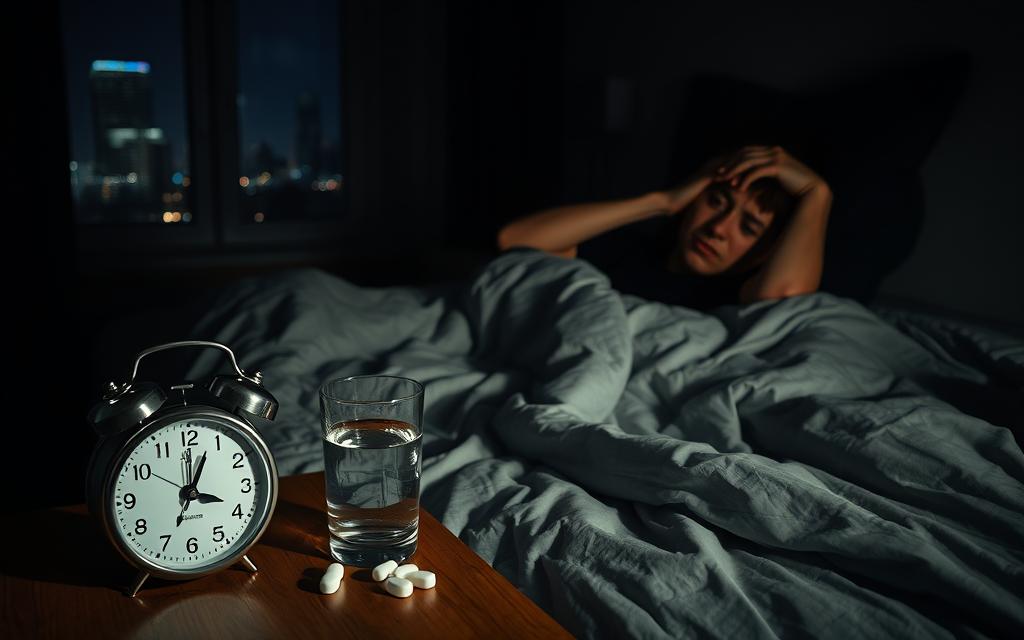
Common Causes of Insomnia
Insomnia affects nearly 30% of adults at some point. It can come from stress, anxiety, and depression, impacting about 50% of those with these conditions4. Too much noise and uncomfortable beds also disrupt sleep5. Lifestyle choices like irregular schedules and using alcohol, caffeine, and nicotine can lead to insomnia6.
Women are 1.5 to 2 times more likely to have insomnia than men, often due to hormonal changes6. As people get older, sleep problems can worsen due to health issues or medication4. Long-term insomnia can hurt job performance and increase accident risks6. Knowing what causes insomnia is key to finding better ways to sleep without medication.

Physical Activity and Its Role in Sleep
Regular physical activity greatly affects sleep, making it essential to include movement in our daily lives. Moderate aerobic exercise boosts slow wave sleep and improves overall sleep quality. Adults who exercised for 30 minutes a day slept 15 minutes longer than those who didn’t7.
For those with insomnia, exercising 30 minutes, three times a week for eight weeks greatly improved sleep7. Research shows that physical exercise improved sleep quality by 0.59 in both insomnia and non-insomnia groups7.
Moderate-intensity aerobic exercise, like for older adults, significantly improves sleep quality when done regularly for 12 weeks to six months7. Elderly individuals who exercised five or more days a week saw a decrease in insomnia7. Also, at least 30 minutes of moderate aerobic exercise can improve sleep quality on the same night8.
It’s important to exercise at the right time. Workouts should be done 1 to 2 hours before bedtime to avoid disrupting sleep. Exercise raises body temperature, making us more awake, and it takes 30 to 90 minutes to cool down, helping us sleep8.
While moderate exercise helps sleep, too intense workouts can make it hard to fall asleep7. So, it’s key to find a balanced exercise routine that suits you. Even fun activities like power lifting or yoga can help improve sleep8.
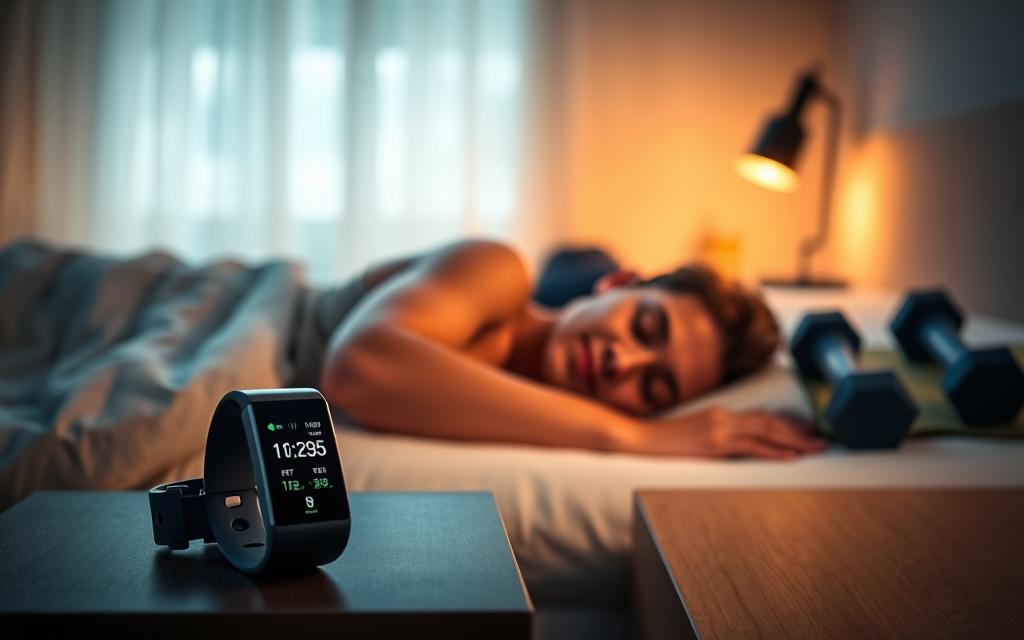
Sleep Hygiene Tips for Better Sleep
Improving sleep hygiene is key for a good night’s rest. By focusing on a few key practices, you can greatly improve your sleep. A consistent sleep routine helps your body’s natural cycles.
The recommended sleep for adults is at least seven hours. Most people don’t need more than eight hours to feel rested9. A structured approach can lead to better sleep quality and duration10.
Establishing a Sleep Schedule
Creating a consistent sleep schedule is vital. It makes sleep a regular part of your day. Adjusting sleep times by 1-2 hours helps keep things stable10.
If you can’t fall asleep in 20 minutes, leave the bedroom. Do something relaxing to get ready for sleep9. Your pre-sleep routine should be calming, lasting about 30 minutes10.
Creating a Comfortable Sleep Environment
A comfortable sleep environment is crucial. The ideal bedroom temperature is around 65 degrees Fahrenheit10. Heavy curtains or eye masks block out light, while white noise machines or fans mask sounds10.
Dimming lights before bed helps your body make melatonin. This prepares you for sleep10.
Limiting Screen Time Before Bed
Limiting screen time before bed is essential. Too much light from devices can make it hard to fall asleep9. Try to stay device-free for 30-60 minutes before bed to avoid blue light10.
Following these tips can greatly improve your sleep. It’s good for your overall health.
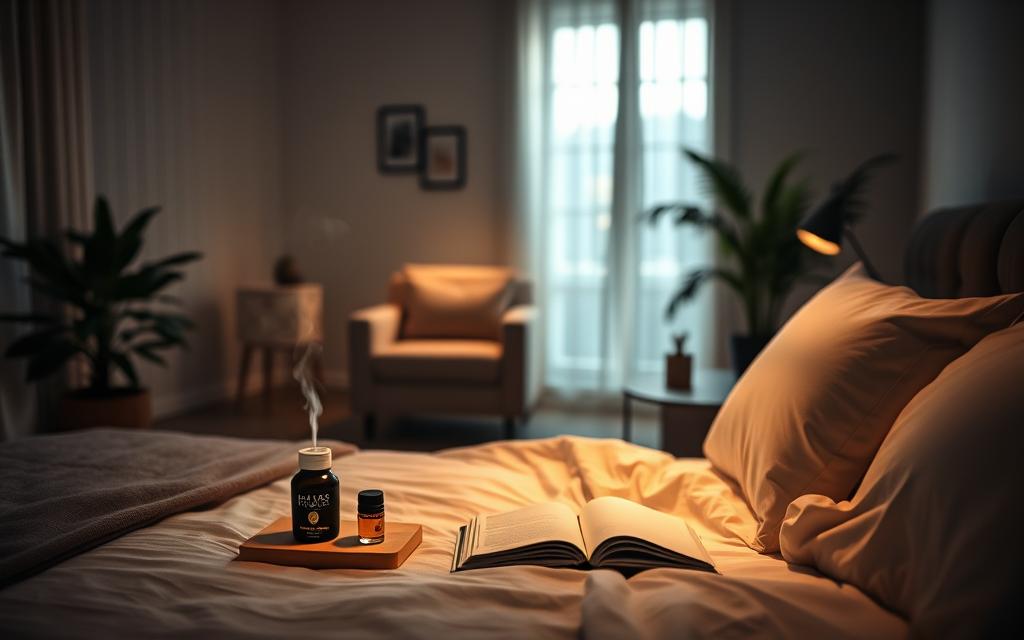
Nutrition’s Impact on Sleep Quality
The link between what we eat and how well we sleep is strong. Some foods can help us sleep better, while others can make it harder. It’s key to eat foods for better sleep and watch what we eat all day and night.
Foods that Promote Sleep
Some foods can improve our sleep. Foods with tryptophan, like turkey and dairy, help us sleep well. Eating foods rich in fruits, veggies, and fiber, and low in bad fats, also helps.
Diets missing carbs, proteins, and fats can hurt our sleep. About one-third of U.S. adults don’t get enough sleep, showing we need better diets for sleep11. A balanced diet also fights off sleep problems like obesity and diabetes12.
Avoiding Caffeine and Alcohol
Drinking caffeine and alcohol can mess with our sleep. Caffeine close to bedtime cuts down our sleep time and quality12. Alcohol might make us fall asleep fast but can disrupt our sleep later11.
Not getting enough sleep can make us crave unhealthy snacks13. It’s important to avoid caffeine and alcohol before bed to manage dietary effects on insomnia.
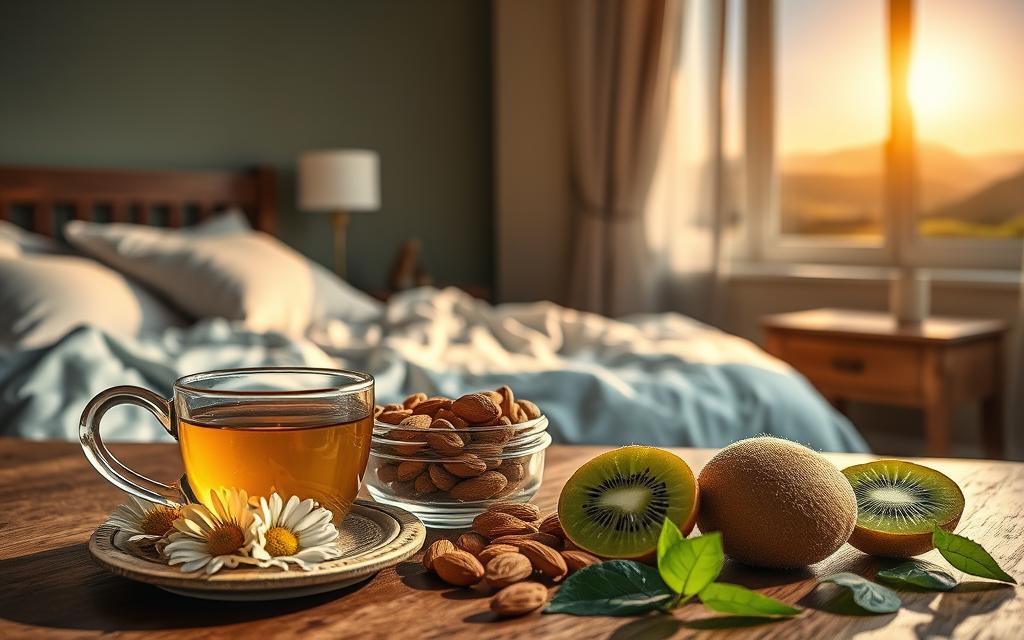
Natural Remedies for Insomnia
Many people look for non-pharmaceutical sleep solutions. They often choose natural remedies for insomnia. Warm milk and chamomile tea are two popular choices. They help improve sleep quality.
Warm Milk and Chamomile Tea
Warm milk is known for its soothing effects. It contains L-tryptophan, which helps make serotonin and melatonin. These are key for good sleep cycles14.
Chamomile tea is also famous for its calming effects. Studies show it can greatly improve sleep quality, mainly in older adults15. Drinking warm chamomile tea or soy milk before bed can make you relax better. This leads to a better night’s sleep14.
Tart Cherry Juice Benefits
Tart cherry juice is known for boosting melatonin production15. Drinking it regularly can increase melatonin levels. This, along with good sleep habits, can improve sleep onset and duration.
Even though scientific proof varies, these remedies are safe. They are good options for those who don’t want to use drugs15.
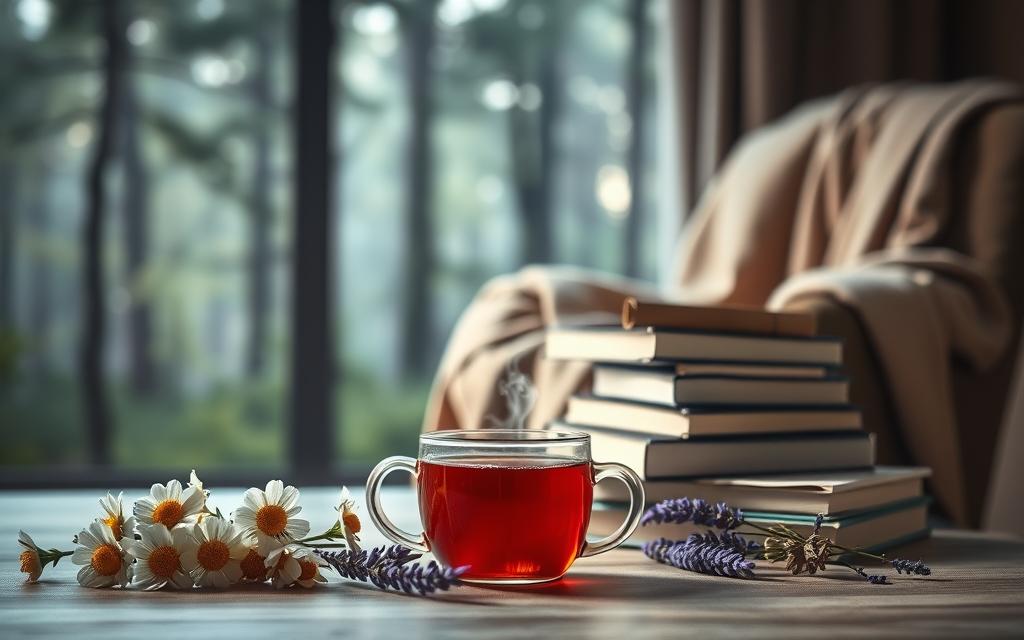
Relaxation Techniques for Better Sleep
Using effective relaxation techniques can greatly improve sleep for those with insomnia. Almost one-third of adults suffer from chronic insomnia, showing the need for good solutions. Stress and anxiety are big reasons for sleep problems, making relaxation techniques key to solving these issues.
Techniques like progressive muscle relaxation and mindfulness are at the heart of stress reduction. They help lead to peaceful sleep.
Progressive Muscle Relaxation
Progressive muscle relaxation is easy to do. It involves tensing and relaxing different muscle groups. You can start with your toes, move up to your legs, stomach, and neck.
This practice helps calm you down. It also starts a relaxation response. Just ten deep breaths can calm you16. Regular practice of this technique can bring lasting benefits.
Meditation and Mindfulness Practices
Meditation and mindfulness can greatly improve sleep. A 2011 study showed that regular mindfulness meditation helped people sleep better. These practices help reduce stress and create a calm space for sleep.
While they might not work right away, they get better with time17. It’s important to make them a regular part of your day.
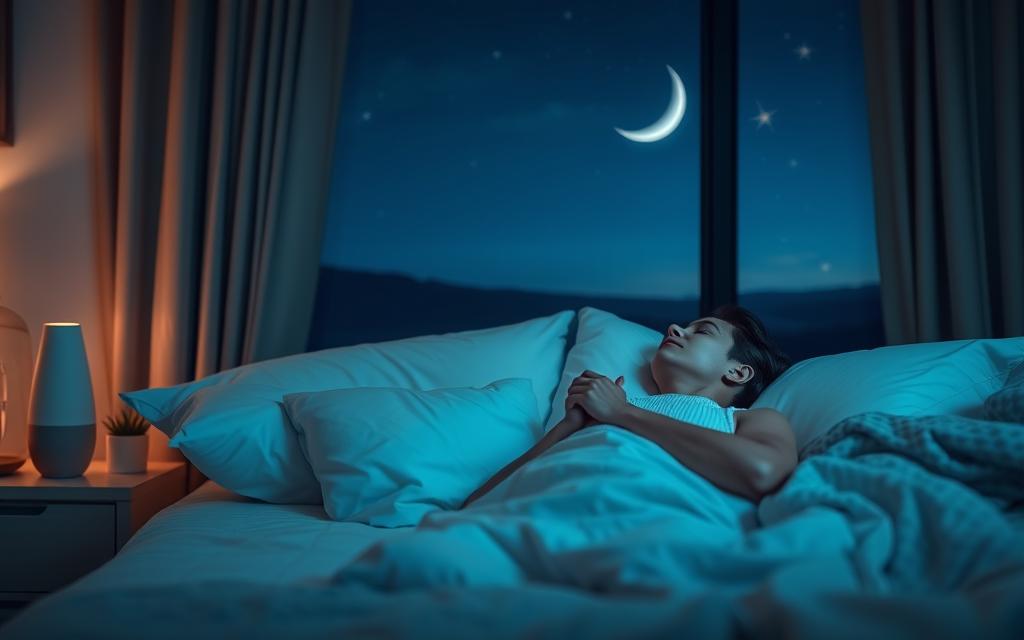
Cognitive Behavioral Therapy for Insomnia (CBT-I)
Cognitive Behavioral Therapy for Insomnia (CBT-I) is a key method for treating insomnia. It focuses on changing negative thoughts and behaviors linked to sleep. Studies show that 70% to 80% of patients with primary insomnia see big improvements after this therapy18.
The American College of Physicians recommends CBT-I as the top treatment for adult insomnia. This highlights its crucial role in treating sleep issues18.
CBT-I helps people develop good sleep habits and reduce sleep anxiety. Treatment usually involves 6 to 8 sessions, each lasting 30 to 90 minutes19. In these sessions, people learn relaxation techniques and how to change their thinking to better manage insomnia19.
CBT-I works well for many groups, including those with PTSD and pregnant women18. Digital CBT-I is also effective, offering similar results to in-person therapy18. It can cut sleep latency by 19 minutes and boost total sleep time by 8 minutes, making it a strong alternative to medication20.
Despite its benefits, CBT-I is not used as much as it could be. This is due to a lack of trained therapists and more people knowing about sleep meds20. It’s important to overcome obstacles like keeping sleep diaries and sticking to sleep schedules to get the best results19. Patients may face initial challenges like sleep deprivation, but these usually lessen as they get used to their new routines20.
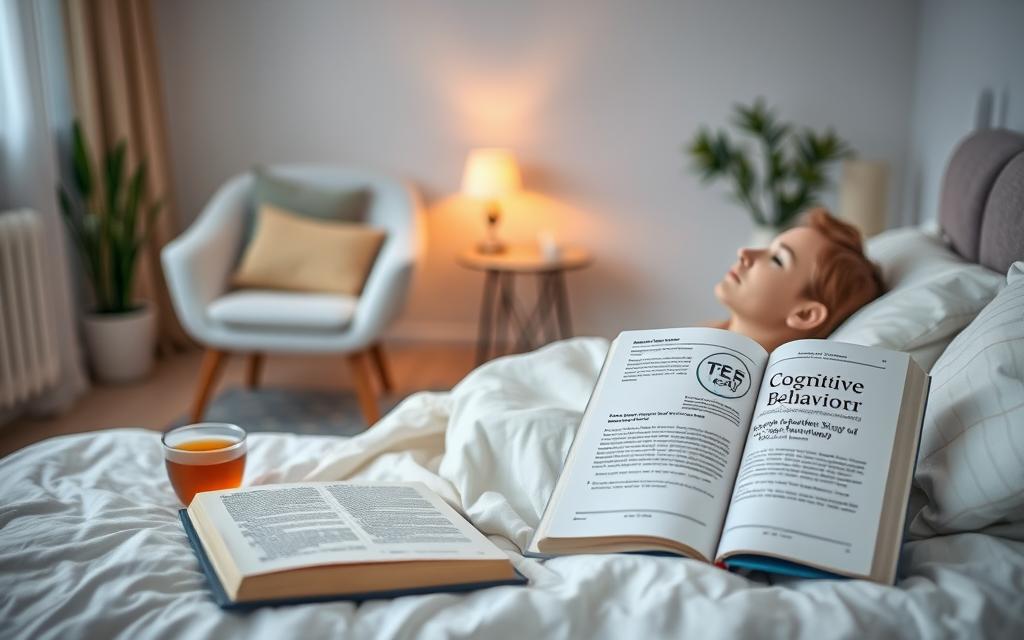
Managing Stress as a Component of Insomnia
Stress is a big problem for sleep, with about one-third of adults dealing with insomnia21. The stress impact on insomnia makes a cycle. Stress makes it hard to sleep, and insomnia makes stress worse. A study found 44 percent of adults had trouble sleeping because of stress in the past month22.
Stress hormones like cortisol and adrenaline can build up because of worry or pain22. To fight stress, it’s key to use stress management for sleep methods. Techniques like deep breathing and muscle relaxation can help sleep and reduce stress22.
Yoga, tai chi, and meditation also help by lowering stress hormones22. People with stress-related insomnia often feel tired, irritable, and can’t focus21. Long-term stress can lead to serious health problems like heart disease and obesity21.
Writing down feelings and changing how you think about things can help21. Learning to manage stress can lead to better sleep and a healthier life.
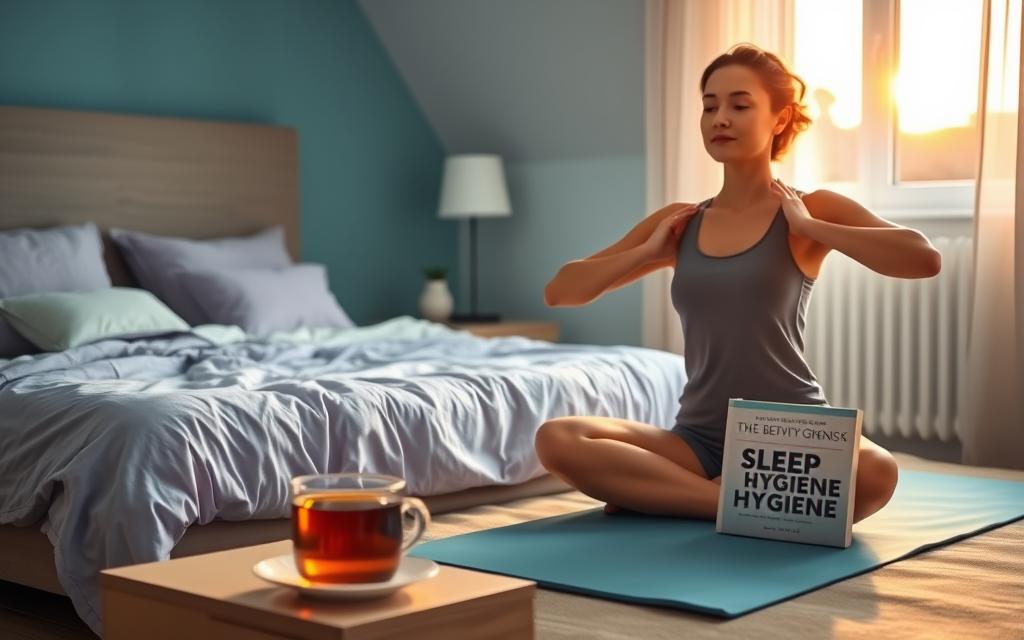
Insomnia Management Strategies
Effective strategies for managing insomnia include various non-medication approaches. One key method is stimulus control therapy. It aims to link the bed only with sleep and intimacy. This helps people stick to a regular sleep schedule and use their bed only for rest.
Stimulus Control Therapy
This method makes the bedroom a sleep-only zone. It helps people sleep better by avoiding stimulating activities in bed. For example, watching screens in bed can disrupt sleep. So, making the bedroom sleep-friendly is essential.
Studies reveal that 70% of those with insomnia face daily challenges because of their sleep problems23.
Sleep Restriction Techniques
Sleep restriction techniques limit bed time. It might seem odd, but it can improve sleep quality. On average, sticking to a sleep schedule can cut insomnia symptoms by 50%24.
Regular exercise also boosts sleep quality by up to 65% for those with insomnia24. When done right, these methods can greatly improve sleep and overall health for those with insomnia.
Light Regulation and Sleep Quality
Keeping the right light regulation for sleep is key for good rest. With tech, many stay up late, messing with their natural sleep cycles. Even a little light at night can mess up sleep cycles and cut down on deep sleep25.
Light therapy helps a lot, mainly for those with insomnia or sleep rhythm problems. It’s a big help.
The Use of Light Therapy
Light therapy acts like sunlight, helping sleep and managing the body’s clock. It uses a light source of 10,000 lux, about 16 to 24 inches from your face26. Sessions last 20 to 40 minutes, boosting sleep and health.
For night shift workers, it fights off sleep problems caused by working at odd hours25.
Studies show it works best with daily use. Many see improvements in a few days to weeks26. It’s great for keeping sleep patterns natural. It’s also good for seasonal depression, with 36% of users feeling less sad26.
Combat Insomnia Without Medication: Holistic Approaches
Many people look for ways to fight insomnia without drugs. Holistic methods aim to heal both body and mind for better sleep. Yoga and tai chi improve physical flexibility and calm the mind, helping sleep quality.
Research shows that regular exercise boosts sleep by 65%. It helps people fall asleep quicker and stay asleep longer27.
Mindfulness and meditation are great for sleep. They reduce anxiety and stress, common in insomnia sufferers. Yoga classes often lead to better sleep, proving its natural benefits28.
Specific therapies, like sleep restriction therapy, show great results. About 75 to 80 percent of people see improvement in four weeks29.
Magnesium-rich foods are key for better sleep. Studies find that supplements help 80% of those with a deficiency sleep better27. Adding these holistic methods to your daily life can solve sleep problems. It shows how important physical and emotional health are together.
Consulting a Healthcare Professional
If you can’t sleep well, even after trying different things, it’s time to see a doctor. A healthcare professional can check for health issues like anxiety or depression that might be causing your sleep problems30. They can also suggest treatments like Cognitive Behavioral Therapy for Insomnia (CBT-I), which is known to help a lot30.
Doctors can also talk about the pros and cons of sleep medicines. They’ll explain the possible side effects and the risk of becoming dependent30. If you’re looking for help, they might suggest sleep studies or relaxation methods like deep breathing or muscle relaxation to improve your sleep30. Getting the right help quickly is key to feeling better and sleeping better.
Conclusion
Many ways exist to fight insomnia naturally. These include changing your lifestyle, eating right, relaxing, and using behavioral methods. About 30% of adults deal with insomnia symptoms every day3132. Finding what causes your insomnia helps you find the right solution for better sleep and health.
This is key because insomnia costs the workplace over $100 billion a year28.
Managing insomnia requires a whole-body approach. Cognitive Behavioral Therapy for Insomnia (CBT-I) has shown to work well, helping 70% to 80% of people28. Adding healthy sleep habits, like a regular sleep schedule and a balanced diet, also helps32.
For those looking to sleep better without drugs, there is hope. By trying these methods and understanding your needs, you can find relief.
FAQ
What is insomnia?
Insomnia makes it hard to fall or stay asleep. It can make you feel tired, moody, and unfocused. It also raises the risk of depression and heart disease.
What are some natural remedies for insomnia?
Try warm milk, chamomile tea, or tart cherry juice. They help you relax and boost melatonin, a safer choice than medicine.
How can I improve my sleep hygiene?
Stick to a sleep schedule and make your bedroom cool, dark, and quiet. Avoid screens before bed to keep melatonin levels up.
What relaxation techniques can I use for better sleep?
Use progressive muscle relaxation, focused breathing, meditation, or mindfulness. They calm your mind and help you sleep better.
How does physical activity affect sleep quality?
Exercise improves sleep by releasing endorphins and promoting deep sleep. But, avoid intense workouts before bed.
What foods should I eat for better sleep?
Eat sleep-promoting foods like warm milk or chamomile tea. Avoid big meals, caffeine, and alcohol close to bedtime.
What is Cognitive Behavioral Therapy for Insomnia (CBT-I)?
CBT-I is a top treatment for insomnia. It changes negative sleep thoughts and behaviors. It’s as good as medication.
How can I manage stress to help with insomnia?
Manage stress with time management, deep breathing, and relaxation. This improves sleep and overall health.
What are some insomnia management strategies?
Use stimulus control and sleep restriction. These strategies help establish a consistent sleep routine and improve sleep quality.
How can light regulation improve sleep quality?
Light therapy in the day and less at night helps your body’s clock. This boosts melatonin and improves sleep.
Are holistic approaches effective for combating insomnia?
Yes, yoga, tai chi, and meditation help. They combine physical activity with mental calm, improving sleep and health.
When should I consult a healthcare professional about insomnia?
See a doctor if insomnia doesn’t get better with home remedies. They can find underlying issues and suggest treatments.
Source Links
- Natural Sleep Aids: Home Remedies to Help You Sleep – https://www.hopkinsmedicine.org/health/wellness-and-prevention/natural-sleep-aids-home-remedies-to-help-you-sleep
- Insomnia treatment: Cognitive behavioral therapy instead of sleeping pills – https://www.mayoclinic.org/diseases-conditions/insomnia/in-depth/insomnia-treatment/art-20046677
- Insomnia: Symptoms, Causes, and Treatments – https://www.sleepfoundation.org/insomnia
- Insomnia – Symptoms and causes – https://www.mayoclinic.org/diseases-conditions/insomnia/symptoms-causes/syc-20355167
- Insomnia – https://www.nhs.uk/conditions/insomnia/
- Insomnia: What It Is, Causes, Symptoms & Treatment – https://my.clevelandclinic.org/health/diseases/12119-insomnia
- The Effect of Physical Activity on Sleep Quality and Sleep Disorder: A Systematic Review – https://pmc.ncbi.nlm.nih.gov/articles/PMC10503965/
- Exercising for Better Sleep – https://www.hopkinsmedicine.org/health/wellness-and-prevention/exercising-for-better-sleep
- 6 steps to better sleep – https://www.mayoclinic.org/healthy-lifestyle/adult-health/in-depth/sleep/art-20048379
- Mastering Sleep Hygiene: Your Path to Quality Sleep – https://www.sleepfoundation.org/sleep-hygiene
- Nutrition and Sleep: Diet’s Effect on Sleep – https://www.sleepfoundation.org/nutrition
- Nutritional Elements in Sleep – PMC – https://pmc.ncbi.nlm.nih.gov/articles/PMC9859770/
- Effects of Diet on Sleep Quality – https://pmc.ncbi.nlm.nih.gov/articles/PMC5015038/
- It Is Possible to Treat Insomnia Without Drugs – https://www.samitivejhospitals.com/article/detail/insomnia-without-drugs
- Home remedies for insomnia: 9 options – https://www.medicalnewstoday.com/articles/home-remedies-for-insomnia
- Relaxation Exercises To Help Fall Asleep – https://www.sleepfoundation.org/sleep-hygiene/relaxation-exercises-to-help-fall-asleep
- 8 Insomnia Home Remedies: Exercises, Oils, and More – https://www.healthline.com/health/healthy-sleep/insomnia-home-remedies
- Cognitive Behavioral Therapy for Insomnia (CBT-I): An Overview – https://www.sleepfoundation.org/insomnia/treatment/cognitive-behavioral-therapy-insomnia
- Cognitive Behavioral Therapy for Insomnia (CBT-I): A Primer – https://pmc.ncbi.nlm.nih.gov/articles/PMC10002474/
- Cognitive-Behavioral Therapy for Insomnia: An Effective and Underutilized Treatment for Insomnia – https://pmc.ncbi.nlm.nih.gov/articles/PMC6796223/
- 5 Ways to Keep Stress From Sabotaging Your Sleep – https://www.verywellmind.com/stress-related-insomnia-3144827
- Sleepless Nights? Try Stress Relief Techniques – https://www.hopkinsmedicine.org/health/wellness-and-prevention/sleepless-nights-try-stress-relief-techniques
- Insomnia self-care: 10 strategies to manage sleeplessness — Calm Blog – https://www.calm.com/blog/insomnia-self-care
- Remedies for Insomnia – https://www.webmd.com/sleep-disorders/remedies-for-insomnia
- Light and Sleep – https://www.sleepfoundation.org/bedroom-environment/light-and-sleep
- Light Therapy for Insomnia Sufferers – https://www.sleepfoundation.org/light-therapy
- Natural Remedies for Insomnia: A Guide to Restful Sleep | AGAPE Institute – https://www.agapefhc.com/blog/wellness-blog/natural-remedies-for-insomnia-a-guide-to-restful-sleep/
- Natural Cures for Insomnia: From Acupressure to Yoga – https://www.sleepfoundation.org/insomnia/treatment/natural-cures-for-insomnia
- How to Relieve Insomnia Without Medications: Part 2 – https://www.onemedical.com/blog/chronic-conditions/how-to-relieve-insomnia-without-medication-part-2/
- Patient education: Insomnia treatments (Beyond the Basics) – https://www.uptodate.com/contents/insomnia-treatments-beyond-the-basics/print
- Non-Pharmacological Treatment of Insomnia – PMC – https://pmc.ncbi.nlm.nih.gov/articles/PMC3480569/
- Tips for Reducing Insomnia without Medication – Epic Wellness Clinic – https://www.epicwellnessclinic.com/tips-for-reducing-insomnia-without-medication/
